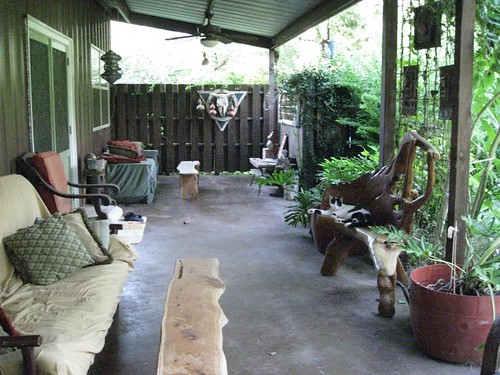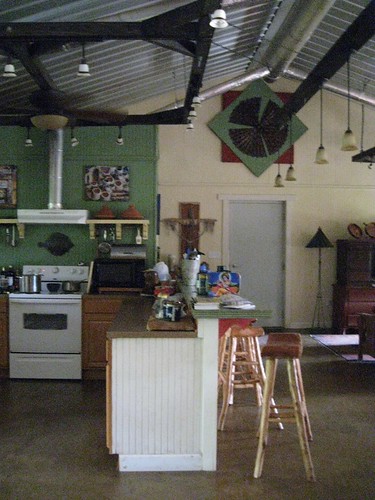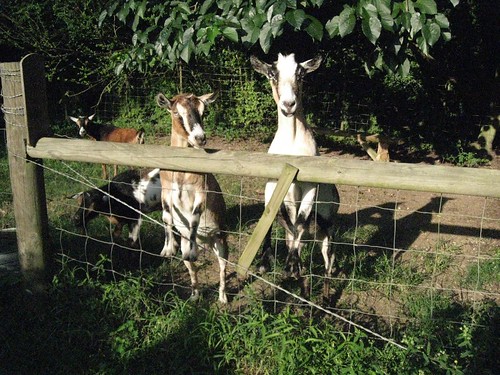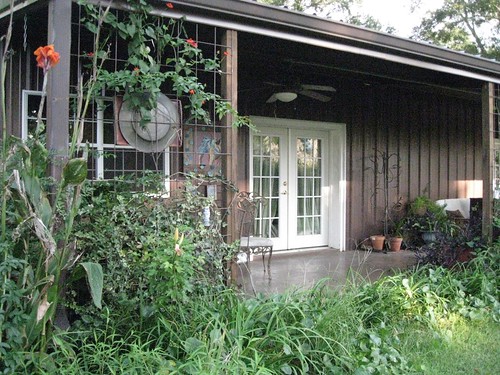Arrival in Mississippi
Creeping across the country, slowly if you're watching me from a bird's eye view, from the air. Yet in my car, i'm hurtling through the air atop roads with bumps and turns and nuance, at top speed. Sudden, and gradual. Portland, Seattle, Boise, Moab, Albuquerque, Texas, Austin, New Orleans, Stennis Space Center, Bay St. Louis. These are some of the names i encountered along the way - all with their own mystique, their own character, their own humidity. I arrived in New Orleans late on a Thursday evening. I could smell the hot, humid air. The warmth and humidity engulfs me whenever i step out of the car, outdoors. Sunset streaks the sky, cirrus clouds painting pink swaths above me and thunderheads gray, white boiling off in the distance ahead. The highway approaching New Orleans is mostly surrounded by swamp and forest - raised highway, bordered by water and trees. I see many, many birds (cormorants?), whom i can't readily identify, not flocking as such, but more like streaking across the sky like the clouds, one or two, every few seconds, so that in the end there are a lot. They beckon me on, silently inviting me into this new place replete with birds and names unknown to me. Other names crop up, intriguing and asking for investigation: Atchafalaya, Ponchartrain. What is there? What are their secrets? Who came before me?
As i travel around the Gulf Coast of Louisiana and Mississippi, one thing has become abundantly clear: Hurricane Katrina changed the landscape: social, ecological. Katrina is a profound marker for this region. Everyone has reference to Katrina, and people, buildings, communities are located around August 2005. On the gulf coast, there are blocks standing empty - "if you know where to look, you'd know there used to be a building there", i'm told. As it is, it looks like a rather peaceful lot. But there's a big cement slab underneath the brush and ivy; telltale of the structure that used to sit on top. Every community, every sector of town: there is evidence of change, post-Katrina. There are the shored up, stately houses, towering over everything on stilts. Not that this region wasn't accustomed to storms; there are sections of towns where houses are required to be on stilts due to regular, shall we say routine, flooding. But Katrina seems to have been a game-changer. I had never visited New Orleans before last week. As i exited off highway I-10, i saw the Superdome i'd heard so much about during Hurricane Katrina and the aftermath. Now, the area around the Superdome is still, 8 years later, in somewhat of a shambles. I phoned the friends i was trying to navigate to in the city.
"What street are you on? What are the cross streets?", they asked.
I had no idea, and as i drove down a large, busy street - there were no street signs for many blocks. Not on the thoroughfare street i was on, not on the side streets. I thought at first it must be that the city has some unusual placement of signs that i didn't see, or that it was a sign of the city's impoverishment (which, i think, it is) - but then, when i had finally found my friends, they told me: no, this was a remnant of Katrina. Missing street signs, including an on-ramp to the highway, i found missing the next day; gaping potholes and road damage that still hasn't been repaired; condemned buildings and houses; these are all glimpses of the city struggling to get back on its feet after the storm. There are many gorgeous dwellings and wonderful gardens in New Orleans. And there are still many signs of destruction, too.
The place i've arrived feels like the tropics. Its still considered sub-tropical, but coming from San Francisco Bay area, and Seattle before that - its been a long time since i've been in hot, humid summer. The air at night is thick and moist, and fireflies dance outside in the flowers. Day and night, this place is teeming with life. Butterflies, crickets, mosquitoes, cockroaches, flies, bees, wasps. I've seen great egrets and cattle egrets and a sapsucker and raptors and turkey vultures and killdeer. The cormorants continue to streak across the sky, every now and then. And this, all within a span of a few days. The roads remind me of the tropics, too. When i was in Costa Rica (twenty years ago now, but still), everything was "se vende" - for sale. Here, i see waves and waves of For Sale signs on fences and buildings; on everything. For Sale! For Sale by owner! I'm not sure if its a remnant of Katrina, or an indicator of the region's economic slump, or some combination of factors, but everyone seems to be selling and not many people buying. When i went looking for places to rent, i saw indicators of economic despair, as well. "We'd be willing to sell the place, too, if you're interested", said one landlord, eager and hopeful. "Oh, you'll be in school? Do you think you could get my daughter a job? She's a teacher", said another. This was the first place i've rented an apartment or room that i can remember not having the landlords from each place asking for quick decisions, because of demand. Weeks go by, and rentals are still open. A colleague mentioned that now would be a good time to buy a place, and it may even be barely possible on our student stipends, but the problem is that the property isn't worth anything once you own it. Its the reverse logic of investing in property. People seem to be saying: you invest in property here, if you really want to be here. Not because you want to make money off of it. New Orleans seems to be a bit different of a story, where there is the remaining devastation of Katrina, but also pockmarks of remodeled houses and lofts selling at better prices. One thing is for certain: the region has a dynamic, vibrant quality to it that draws people here, and rests in people's bones so that they don't want to leave.
I have somehow wandered into a small sanctuary, to live in. The place i settled on is a house, cool inside (but not cold), with gardens and goats and cats and flowers and acreage. Its out in the country, at the edge of Mississippi state line. There are horses and ranches and farms, and woods and rivers nearby. Its so remarkably quiet. Sure, i miss my view of City Hall all lit up for some occasion, i miss my view of the Bay Bridge and the BRIGHTER GREATER murals. But here, there is no paved street outside my window. There is moon, and mist, and insects buzzing. There is the rustling of the tree's leaves. Ginger grows at one end of the garden, and when i walk out onto the porch, i know i'm in the tropics again - transported instantly by that intoxicating scent.
Wednesday: first day of classes. I have the feeling i'm a the foot of a mountain, or maybe i should say the edge of the swamp. I can see the swamp, i can see how rich it is and how many stories and mysteries it must hold. I want to know all of the stories, and be able to tell them properly, to sing the song of this place. And i feel excited to be formally learning about the world oceans. So the journey begins: understanding the language of oceanography. Dictionaries and translating and slowly building vocabulary to then venture into the swamp, and spend many days and nights learning and immersing. There is work ahead, and our fearless guides have stood up before us and prepared lectures and staked their careers on imparting knowledge, know-how, humor and good will. There is much to do.





